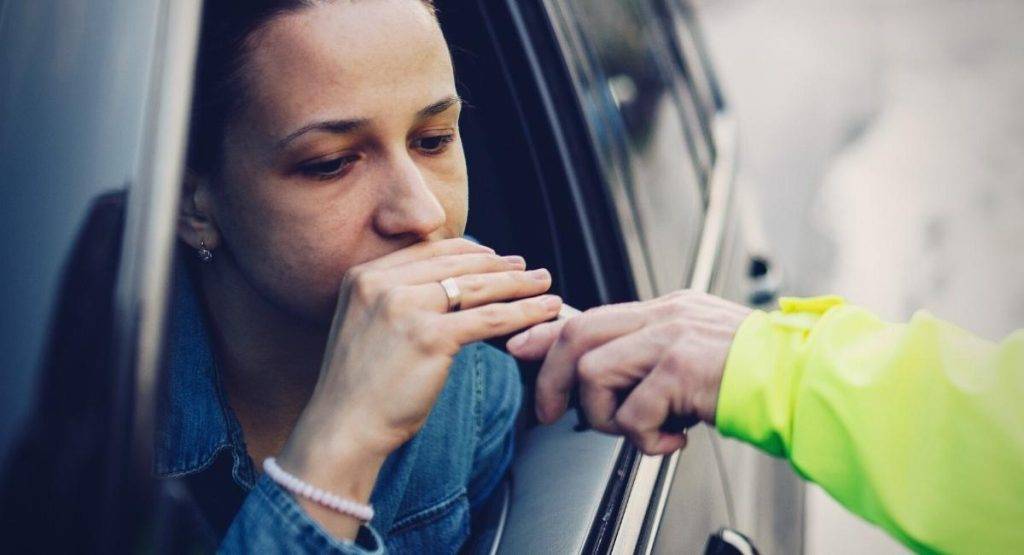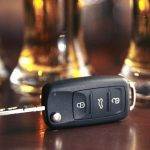Most people who live in Texas do not have encounters with the criminal justice system until they are arrested for driving while intoxicated (DWI), an exceptionally common crime in jurisdictions all over the country. A DWI arrest customarily begins with a police officer initiating a traffic stop.
In its Visual Detection of DWI Motorists guide, the National Highway Traffic Safety Administration (NHTSA) developed a list of over 100 driving cues that it says were found to predict blood alcohol concentrations (BACs) of 0.08 percent or greater. The driving behaviors identified by officers are presented in four categories:
1) Problems in maintaining proper lane position
- Weaving
- Weaving across lane lines
- Straddling a lane line
- Swerving
- Turning with a wide radius
- Drifting
- Almost striking a vehicle or other object
2) Speed and braking problems
- Varying speed
- Accelerating or decelerating for no apparent reason
- Stopping problems
- Slow speed (10+ mph under limit)
3) Vigilance problems
- Stopping in lane for no apparent reason
- Slow response to traffic signals
- Driving wrong way on one-way or in opposing lanes
- Slow or failure to respond to an officer’s signals
- Signal inconsistent with action or failure to signal
- Driving without headlights at night
4) Judgment problem
- Following too closely
- Improper or unsafe lane change
- Illegal or improper turn (too fast, jerky, sharp, etc.)
- Driving on other than the designated roadway
- Stopping inappropriately in response to officer
- Inappropriate or unusual behavior (throwing, arguing, etc.)
- Appearing to be impaired
Post-stop cues include difficulty with motor vehicle controls, difficulty exiting the vehicle, fumbling with driver’s license or registration, repeating questions or comments, swaying, unsteady, or balance problems, leaning on the vehicle or other object, slurred speech, slow to respond to officer or officer must repeat, providing incorrect information or changing answers, and odor of alcoholic beverage from the driver while cues combined with any other cue include driving without headlights at night or failure to signal or signal inconsistent with action.
Any of these cues will constitute reasonable suspicion for an officer to initiate a traffic stop for DWI. When the officer comes to your window, the first thing they will usually ask is whether you have had anything to drink.
Many people will often respond that they only had “two or three” drinks, which most officers will take as being a lie. The police officer’s next step is usually then to ask you to step out of your vehicle and submit to a breath sample, usually provided through a preliminary alcohol screening (PAS) that is a handheld device the officer can use to measure a person’s BAC.
You will often be informed that you have an obligation to submit to this test simply by being licensed in Texas. This is also known as taking a breathalyzer test.
Many people want to know if they have the right to refuse breathalyzer tests since a person who has only had a few drinks has no idea what their BAC is and may have concerns about failing the test. You can very well refuse to submit to a test, but that will not necessarily prevent you from being arrested for DWI and it can make your criminal penalties worse than if you had complied.
How Does The Texas Implied Consent Law Work?
When an officer pulls a person over on suspicion of DWI, they must provide certain disclosures under Texas Transportation Code § 724.015. Before they can request a blood or breath sample for alcohol concentration testing, the officer must inform the driver of the following:
- Any refusal can be used at a trial if the driver is subsequently charged with an offense arising from the same situation;
- If a person refuses, they will receive an automatic driver’s license suspension, even if they are not later charged with a DWI;
- If a driver is 21 years of age or older and they submit to testing but have an alcohol concentration level of 0.08 or higher, their license is automatically suspended for a minimum of 90 days, even if they are not later prosecuted for a DWI;
- If a driver is less than 21 years of age, they submit to testing, and have any amount of alcohol in their blood or breath, their license is automatically suspended for a minimum of 60 days;
- If a driver is less than 21 years of age and they refuse testing, their license is automatically suspended for a minimum of 60 days; and
- If a driver receives an automatic license suspension, they have the right to a hearing within 15 days of being given a notice of the suspension.
Under Texas Transportation Code § 724.013, drivers pulled over on suspicion of DWI in Texas are allowed to refuse chemical alcohol and drug testing of their breath or blood, except in certain situations. Even if a driver refuses, a police officer can chemically test a person’s blood or breath if:
- Someone besides the driver has died, will die, or suffered a serious bodily injury because of a motor vehicle or boating accident;
- The driver had a child passenger in the vehicle; or
- The driver has been previously convicted or placed on community supervision for at least one DWI with a child passenger, DWI assault, DWI manslaughter, or any two or more DWI offenses.
If a person does refuse to submit to testing, they will receive an administrative license suspension. It is important to remember that a driver’s license is considered a privilege granted by a state, and not a civil right.
In Birchfield v. North Dakota, 579 U.S. ___ (2016), the Supreme Court of the United States held that a search incident to arrest doctrine permits police officers to conduct warrantless breath tests but not warrantless blood tests on suspected drunk drivers. The Supreme Court determined that a breath test does not require the police to obtain a warrant, but a blood test does.
Understanding Implied Consent
The implied consent law will only be a factor after you are placed under arrest for DWI, as you will have to submit to another breath test on a machine at a police station. A police officer needs to have probable cause to make an arrest, which means reasonable grounds for making a search or pressing a charge.
Following an arrest, Texas implied consent law assumes you will submit to a breath test at a police officer’s request. If you happen to refuse, then a police officer could try to obtain a search warrant from a judge authorizing a qualified individual to take a sample of your blood without your consent.
Blood tests are only likely in the exceptions for the cases listed above regarding crashes causing death or injury, child passengers, or prior DWI convictions.
Impact of Breathalyzer Refusal on Criminal DWI Cases
When you are arrested for DWI and refuse to submit to breath testing, a prosecutor will be allowed to present your refusal as evidence in court. It will not constitute a violation of your Fifth Amendment right against self-incrimination and prosecutors will instead argue it is in itself proof that you knew you were intoxicated.
While you might be wondering how a prosecutor can effectively prove you were intoxicated without evidence of you having a BAC of 0.08 or greater, remember that the Texas definition of intoxicated also includes “not having the normal use of mental or physical faculties by reason of the introduction of alcohol, a controlled substance, a drug, a dangerous drug, a combination of two or more of those substances, or any other substance into the body.” In other words, a police officer’s observations of your behavior can be sufficient.
Breathalyzer Refusal Impact on Driver’s License
The civil consequences of refusing a breathalyzer include the immediate suspension of your driver’s license. The Texas Department of Public Safety (DPS) will initiate the civil process known as Administrative License Revocation (ALR), which begins as soon as you are arrested.
When you refuse a breathalyzer test, the arresting officer will immediately confiscate your driver’s license. The officer also gives you a written notice that your driver’s license is being suspended.
The suspension does not take immediate effect, as you will be given a temporary permit. You have 15 days from the date of an arrest for DWI to request a formal hearing before the DPS.
When you do not ask for a hearing, you are considered to have waived your right to a formal hearing and a default judgment suspending your license will be entered against you. If you request a hearing, it is not before the same judge who is overseeing your criminal DWI case.
Instead, it is an administrative law judge (ALJ) who works for the DPS. At the hearing, the role of an ALJ will be exclusively limited into looking at whether an officer had probable cause to arrest you for DWI and if you refused a lawful request for a blood or breath test.
Because it is not a criminal proceeding, DPS does not need to establish your guilt for DWI, just the probable cause and refusal. Once a suspension actually does take effect, you will typically lose your ability to drive for a minimum of 180 days.
In certain cases, refusal to submit can lead to much longer driver’s license suspensions of up to two years. This civil penalty usually applies when a person has at least one prior “alcohol-related or drug-related enforcement contact” in the 10 years before their current DWI arrest.
Find A Dallas County Defense Attorney for DWI Charges | Law Offices of Richard C. McConathy
Richard C. McConathy is a Dallas DWI lawyer who handles all kinds of DWI cases in North Texas, including refusal to submit cases. He knows how to help people overcome criminal charges in these cases and may be able to get your criminal charges reduced or completely dismissed.
The Law Offices of Richard C. McConathy represent people in first DWI, second DWI, and third or subsequent DWI cases. We also handle juvenile or underage DWI cases, intoxication manslaughter, and intoxication assault cases.
Did the police arrest you for DWI in the greater Dallas area after you refused to submit to a breath test? Do not wait another moment to contact The Law Offices of Richard C. McConathy.
Our firm offers a free consultation to review your case and answer all of your legal questions. Call (972) 233-5700 or contact us online today to take advantage of yours and get the help you need.





